We are now introduced — though not immediately — to the other driving narrative here in The Life Aquatic. Up to this point, the film has been suggesting that our story will be one of revenge, with Steve seeking out and destroying the monster that ate his friend. And just in case we’ve forgotten this, Captain Zissou gets a big, dramatic moment in which he declares his intent to his crew…just before we see those intentions derailed by the arrival of probably-his-son, Ned.
This is a Wes Anderson film, however, so when a lost and confused son meets at last with his distant father, we know that that’s going to take narrative precedence over anything we might have seen already. Sure enough, it’s the relationship between Steve and Ned that drives the film, pulls us forward, and provides the characters with their real journey.
The scene opens with a small after-after-party aboard the Belafonte. As we’ve discussed previously, this is at last a chance for Steve to exercise some all-important control over his night, as he is in charge of the guest list and even has his staff shuttling guests to and from the ship in dinghies. It’s an isolated party for an isolated man, and he’s using the water as a buffer between himself and the world he does not care to understand. They say that no man is an island, but Steve Zissou seems to aim to be the first.
The after-after-party seems to run smoothly enough, and it gives us a lovely glimpse into the baseline operational structure of Team Zissou: Pelé performs music from the sidelines as Renzo the soundman records him, youthful Ogata and Anne-Marie socialize with guests, interns man the bar and serve appetizers, and Steve shuts himself — yet another level of isolation — in the cabin, away from anything that might be going on outside, even when it’s a party in his honor.
We’ll be discussing the individual members of Team Zissou more in the next section, but it’s enough to point out now that the serious electrical faults of the Belafonte are currently being repaired by Steve’s camera man and an intern whose name he doesn’t know.
Pelé’s song here serves as a sort of Rosetta Stone for the rest of his music in the film. By opening the scene on a long establishing shot of the Belafonte, Anderson gives us very little to focus on apart from what we’re hearing, which happens to be the instantly (and universally) recognizable intro to “Ziggy Stardust.”
The song itself isn’t particularly appropriate to the event or even the film itself — apart from some thematic science-fiction resonance that we may discuss later on — but it’s important that we hear this one first, simply because it’s recognizable. It’s a rare thing indeed to find an “obscure” Bowie song in Pelé’s repertoire, but the acoustic arrangements and Portuguese lyrics will render many of them unrecognizable (or at least less-easily recognizable) to anything other than the biggest fans of that androgynous icon.
So we get “Ziggy Stardust,” a song well known by anyone who’s ever turned on the radio, with one of the most distinctive opening riffs in rock history. The audience is now in the mind for Bowie, and it will make it that much easier to pick up on the vague, later echoes of “Rebel Rebel” or “Rock N Roll Suicide.”
Steve’s isolation is interrupted by Oseary, who delivers the ominous news that Larry Amin will have to consider the profitability of Steve’s next film before he decides to bankroll it. It says a lot that a benign and rational consideration of such a thing could be seen as ominous to Team Zissou, and Oseary confirms that it’s been nine years since Steve’s last “hit documentary.” One gets the feeling that by the lowered standards and ambitions of Zissou and his crew that “hit” is a relative term indeed, and might as well be replaced with the word “profitable.”
Here we also see a bit more of life aboard the ship. Klaus’s nephew Werner is the only one at all still enraptured by the magic of what these explorer / documentarians do, and he toys excitedly with some unseen creature that’s kept in an aquarium. Everybody else simply waits for the night to be over, whiling away the evening so that they can return to their almost perversely mundane “adventures.”
Klaus and Wolodarsky play backgammon, and Eleanor, quite tellingly, engages herself in a game of solitaire. Nobody offers to show the child around the ship, and it’s his responsibility to occupy himself blandly, as the adults are doing. If the actual film Steve premiered tonight didn’t sap any excitement that Werner might have had at meeting Steve, seeing his team hiding from their own prior glories and shruggingly postponing an electrical catastrophe certainly will.
Speaking of which, the potential of a ship-wide electrical failure when they could be anywhere at sea, under any circumstances, says a lot about the danger this crew is in, operating under a disinterested captain like Steve. The blackouts are played as a sort of rolling punctuation to important moments in the film we’re watching, but they’re also a harbinger of danger to come. See too Steve resuscitating a nearly-drowned Ned. What’s played for laughs up front can result in real and irreversible loss down the line.
Steve pushes Oseary to push Amin, and when he does not get what he wants he declares again his intentions to avenge Esteban, and storms out of the cabin. This is where he meets Ned.
Firstly, and interestingly, Ned addresses Steve as “Captain Zissou.” There’s no much we can say about this now, but it’s worth keeping in mind that to everybody else, including his own crew, he’s just “Steve.” This is a term of respect Steve has likely not heard for a long time.
Ned introduces himself, and Steve is immediately — and visibly — thrown off guard. He recognizes the name of Ned’s mother, and freezes. How much Steve actually knew about Ned prior to this moment is a subject of much contradiction over the course of the film, and even, in fact, in this very exchange. Steve’s “I’ve heard of you” suggests a belief on his part that Ned may actually be his son, but his “She never contacted me” seems to leave him — at least in terms of his own conscience — clear of responsibility. It’s his selfish, yet personally justifiable, way of having maintained a distance for this boy’s entire life. The responsibility for contact was Catherine’s, not Steve’s, and since there was no contact, Ned wasn’t Steve’s problem.
But his “I’ve heard of you” tells a different kind of story. One of unconscious drift, perhaps. One of a man who drinks and smokes and pops pills to force things out of his mind, but can never quite forget them. He doesn’t recognize Ned when he first meets him not because he’s never thought about him (as evidenced by the fact that he kept young Ned’s letter), but because the reality does not overlap with whatever phantom child Steve might have imagined to himself. It’s safe to say that whatever Steve pictured, it wasn’t a 30-year-old co-pilot.
Reality intrudes. Esteban was eaten. Steve’s films no longer make money. Reality intrudes.
Owen Wilson’s accent here rings somewhat false, and yet his earnest gentleness keeps it from veering into Foghorn Leghorn territory. It’s no more real than the sea creatures we’ve discussed…exaggerations and caricatures of the world we know. We need them to be exaggerated so that we — no matter who we are — can stand apart from them. The sea creatures can’t be familiar to any oceanographers in the audience, and Ned can’t be familiar to any native Kentuckians. This is a world Anderson created, and we are all observers. We are all at a distance. We’re not allowed to get too close.
Ned’s mother’s death is a sustainment of an echo that runs through many of Anderson’s films: Max Fischer’s mother, Royal Tenenbaum’s mother, Ari and Uzi Tenenbaum’s mother, the Whitman patriarch, Sam Shakusky’s parents…even the comparatively light Fantastic Mr. Fox toys with the idea of losing a parent. In the case of Max, he also lost his mother to cancer, and cancer is what Royal pretends to be killing him. Another character in that film, Henry Sherman, lost his own wife to cancer. Cancer, being both an unforeseeable intrusion of reality and something that kills quietly from within, fits perfectly into Anderson’s narrative wheelhouse.
Leaving nothing to chance at this point in his life — and this evening — Steve outright asks Ned, “You’re supposed to be my son, right?” He’s ensuring that they’re on the same page, and Ned’s answer is that he isn’t sure…but he did want to meet Steve. Just in case.
It’s a brilliant dance of emotional distancing. Ned is meeting both his father and his hero for the first time, and Steve is uniquely equipped to disappoint in both capacities. Neither takes the initiative to close the gap — though we do have to give Ned credit for coming all this way “just in case,” which is something Klaus calls him on later — and Steve’s just-out-of-frame handshake is a masterstroke of social desperation. Steve is meeting his son for the first time, and like Gabriel Conroy offering money to the maid he’s offended, knows not what to do but knows he must do something.
Steve excuses himself and we see the first of two long, emotionally-charged strolls he takes in the film to the accompaniment of a David Bowie song. This is Bowie’s original version of “Life on Mars?” here, though Pelé will also sing it later.
Taking both performances of “Life on Mars?” in tandem, and considering their contexts, they reveal a subtle and somewhat crude joke. Both times we hear “Life on Mars?” it is during a conversation between two characters about whether or not Steve could have fathered Ned. The first time it’s between Steve and Ned themselves, and the next time it’s between Eleanor and Jane. When Bowie asks about life on Mars, he’s wondering about the possibility of finding living organisms in a lifeless sphere. When Steve’s paternity is in question, they wonder about the possibility of finding sperm in his lifeless testicles. It’s a crude grounding of scientific wonder, but it’s hardly devoid of magic or majesty.
Steve returns and apologizes for his behavior — frame that moment, because it isn’t likely to happen again — and is approached by a much happier, and presumably drunker, Oseary. He has good news for Steve, as he spoke with Si Pearlman (whose surname is another passive reference to the undersea world), the editor of Oceanographic Explorer magazine.
Later we will see — in one of this film’s rare static insert shots — that Captain Hennessey has already been featured on the cover of this magazine, and this is Steve’s chance to regain, however briefly, the same level of exposure. A moment ago, in the cabin, Steve would have had something to say to this. Now, having encountered Ned, he ignores it — along with Oseary’s request to be nice to the magazine’s reporter — in order to introduce “probably [his] son.” Oseary, through untold years of experience working with Steve, has probably taken to handling all of his unexpected and inexplicable meetings with a bright, and hollow, “How delightful!” as he does here.
It’s the first of two back-to-back introductory embarrassments for Ned.
The next is a very brief scene when his backstory is explained to Eleanor by Steve, while Eleanor has no idea that he’s standing right beside her. It’s a brilliantly comic moment and it makes glorious use of Anderson’s signature blocking, as the entire joke is there in the frame but isn’t revealed until Steve’s final line. Eleanor also has a fantastic internal moment when she juggles disgust for Steve’s behavior here with a polite greeting to Ned.
As with Oseary, we get the feeling Eleanor has been through something similar many times before, and is used to being forced into conflicting emotions by her husband. In public, she must handle them both. In private, her options expand a bit, and we’ll see the result of that before the Belafonte officially sets sail.
In the background Pelé performs “Oh! You Pretty Things” which is barely audible and arguably unrecognizable without the complete soundtrack version. He also played a song during Steve and Ned’s meeting that I still can’t make out, which suggests that Anderson chartered a little too much material from Seu Jorge, and then was unable to find a natural home for every track. Rather than leave much of it on the cutting room floor (though some tracks certainly were), we hear Pelé tunes in strange places like this, wedged between grander moments, and relegated to an almost inaudible background. It’s sloppy soundtracking, but a natural extension of the stylistic musical collision we discussed in the first post of this series.*
We end with a short exchange between Ned and Steve standing above the action on the Belafonte. I’m not sure what this part of the ship is called, but it’s the same part that a ghostly figure of Ned is standing upon at the end of the film…which we’ll likely discuss more then, of course. (In the meantime please let me know what this is called, so I don’t have to sound so danged stupid all the time.)
Steve offers marijuana to Ned, who refuses, and lights a pipe instead. Similar, and yet different. We’ll see more of this distanced similarity between the two as the film progresses.
Ned reveals that he’s been a member of the Zissou Society since he was 11, and Steve feigns surprise. As we’ll see later, Steve already knows this (confirmed by the letter of Ned’s that he kept), and Ned already knows that he knows (confirmed by Catherine Plimpton before she died). Here they are feeling each other out…each gauging what the other knows, what the other will admit to knowing, and how far the other might go to conceal what he knows.
The fact that Ned was once a young fan of Steve’s (from his glory days, as according to Oseary Steve’s films became unprofitable around the time Ned was 21, meaning Ned had a full decade of enjoying Team Zissou output in its prime) sets him up as a reassuring whisper from Steve’s past…a past that grows more distant by the day. We’ll talk about this more when we meet Jane, who functions as an unwelcome reflection of Steve’s present. (Both of which, and more, feed into last time‘s discussion of The Life Aquatic as A Christmas Carol. More on that to come, surely.)
Ned reveals also that he’s currently a pilot (well, co-pilot) for Air Kentucky, which gives Steve another — and always welcome — chance to posture when he dismissed Kentucky as “landlocked.”
It’s the chance for Steve to play a part…a caricature of oceanographic explorers that you might encounter on Saturday mornings, perhaps one paying a visit to Pee-Wee’s Playhouse.
It’s not real…it’s an act. It’s a purposeful embodiment of what people expect to see and hear, so that they won’t feel inclined to dig any deeper. This will resurface again in his first interview with Jane. Favorite color, blue. Favorite food, sardines. Kentucky, landlocked.
But Jane digs deeper. And in her presence, so does Ned.
Steve talks Eleanor into letting Ned come along because it will be a very special opportunity for all of them. What he doesn’t know is that the opportunity is deep inside himself, and not deep within the sea that surrounds them.
Next: Let Steve tell you about his boat.
—–
* Oh, and on the subject of music, the version of “Life on Mars?” that plays here has an extended piano introduction, and it’s genuinely an improvement on an already gorgeous song. Does anybody know where this comes from? Was the intro recorded and appended by somebody working on the film, or does it come from Bowie’s own rarities or outtakes somewhere? In case you can’t tell I’m asking because I WANT IT.
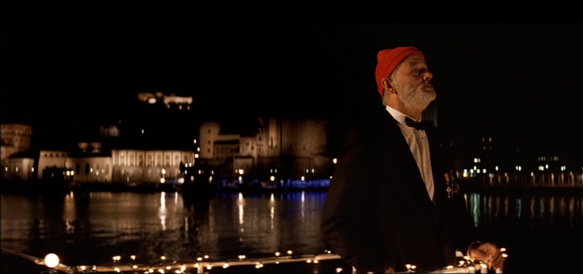
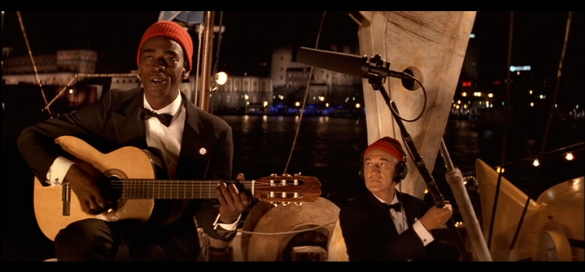
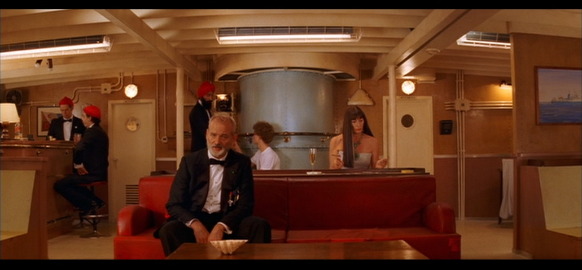
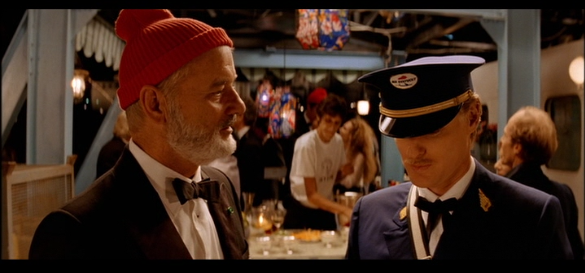
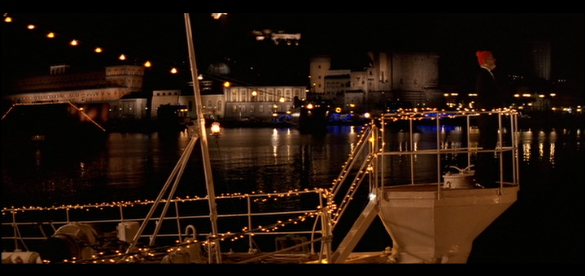
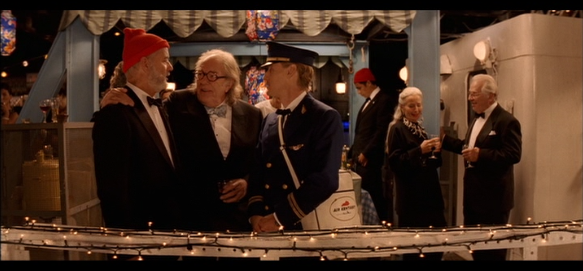
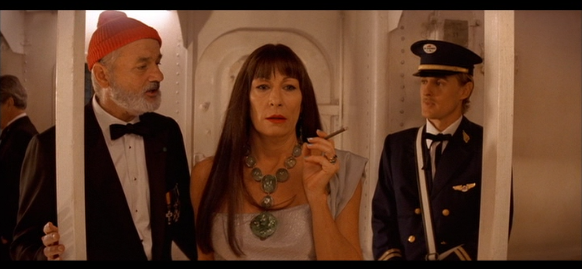
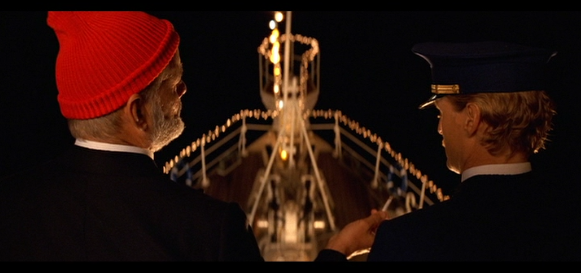
The conversation that Steve has with Eleanor about Ned that you discuss here seems incongruent with Steve asking Ned to join Team Z on the beach and Ned hesitates…why didn’t Ned refuse when Steve asked his wife the first time? (If that is indeed what they were discussing – it was never really clear to me)
SB :)
Yeah, I cover that a bit in part 5, which you asked about in the other post. Spoiler: I HAVE NO ANSWERS I AM A FOOL
–
Thanks for reading. I really, really need to finish this series…